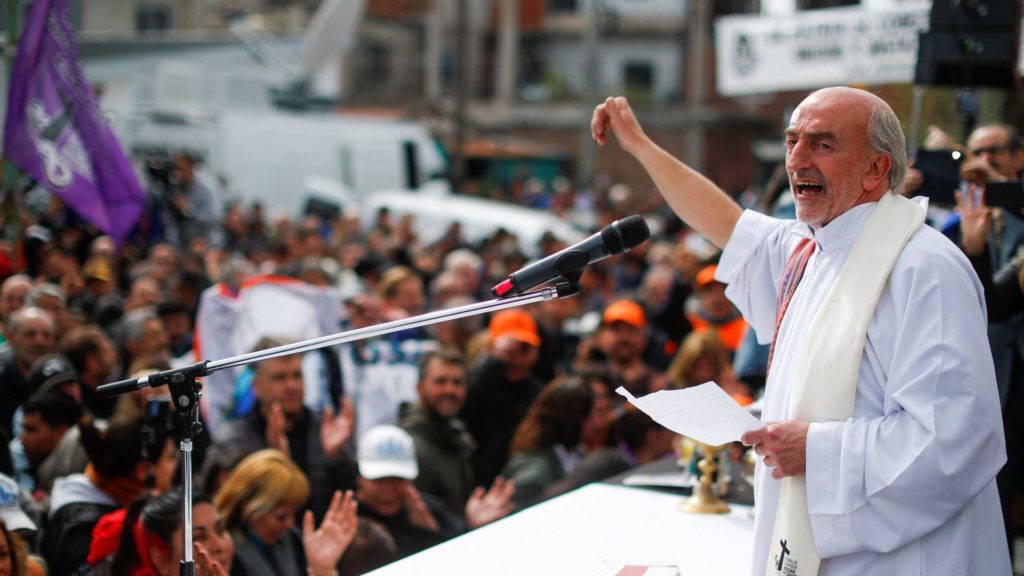After President Javier Milei’s administration decided to cut funds for public works in poor neighborhoods and slums in Argentina, dozens of priests released a letter protesting the measure.
A decree promulgated by Milei on February 23 radically reduced the share of a tax collected on the purchase of foreign currency that is directed to integrate the slums into the cities. Until then, nine percent of such funds should be used in poor neighborhoods. Now, that portion corresponds to only 0.3 percent.
A significant part of such money used to be transferred to co-ops that employ mostly local slum residents and were hired by the government for sewerage, public lighting, and pavement works.
Such co-ops are connected to popular movements, which largely rejected Milei during the presidential campaign last year. His administration suspected there were irregularities in the use of the funds and investigated it, but no evidence of corruption was found.
According to the Spanish-language news website InfoBae, since the creation of the program in 2019, almost 1,300 construction works have been carried out.
The public letter was released by the so-called curas villeros (slum priests in Spanish), an ecclesial ministry developed during the 1960s and 1970s by missionaries who live and work in Argentina’s poorest neighborhoods. The document was also signed by the clergy members in charge of the Church program Hogares de Cristo (homes of Christ), which gives support to drug addicts.
The priests begin the text by saying that “one of the main functions of the State is to look after the most disadvantaged,” an idea that directly opposes Milei’s ultra-libertarian ideology and his intention of reducing the State’s participation in the South American country’s economy and society.
The declaration then recalled that “the slums did not appear on the maps” in the past, and only after a few decades the Argentinian society understood that it needed to deal with them.
“People talked about their eradication, then urbanization, till the concept of urban integration was quite established. With comings and goings, steps were taken in this direction,” the letter read.
The priests emphasized that policies were gradually established to improve the slums’ conditions, giving to many of their residents better access to sanitation, water, electricity, schools, and community centers.
“Others were able to expand and improve their humble homes. It is not good to disconnect the State from the slums and settlements. Reducing the funds that benefit more than 5 million residents, most of them minors, is a very hard blow,” the priests continued.
The document concluded by saying that the program is one of the few that focus on the hardest core of poverty in Argentina. The priests ask the national government to “check what is necessary so that socio-urban integration is an increasingly effective reality.”
According to Father Lorenzo de Vedia, known as Padre Toto, a missionary in one of the largest slums in Buenos Aires, the funds that have been cut were “fundamental for the integration of slums and settlements into the urban environment.”
“That money was used to improve several aspects in the lives of the residents of such districts,” he told Crux.
Father Pablo Viola, a vicar in a poor neighborhood in Córdoba, emphasized that those funds “generated work for slum residents and helped those people to progress.”
“Cutting that money means to block the prosperity of many people. There are 5 million slum residents all over Argentina, and part of them counted on that program,” he told Crux.
Viola recalled that Milei’s administration has been reducing other social relief actions, something that has been affecting not only the poor but also the middle classes.
“We think that reducing the funds for civic organizations which assist the poor is a mistake connected to an inability to understand the reality in Argentina. That increases the malaise we have been experiencing,” he said.
Viola described that it’s already noticeable how Milei’s policies have impacted poor neighborhoods in Córdoba, “zones where some progress was possible in the past and which are now stagnating again.”
Padre Toto affirmed that after the letter was released the government branch in charge of the program accepted to receive them for a meeting.
In Viola’s opinion, the government should listen to civic organizations and the Church in order to better understand Argentina’s social problems.
“It’s fundamental that this administration comprehends the importance those funds have,” he said.

